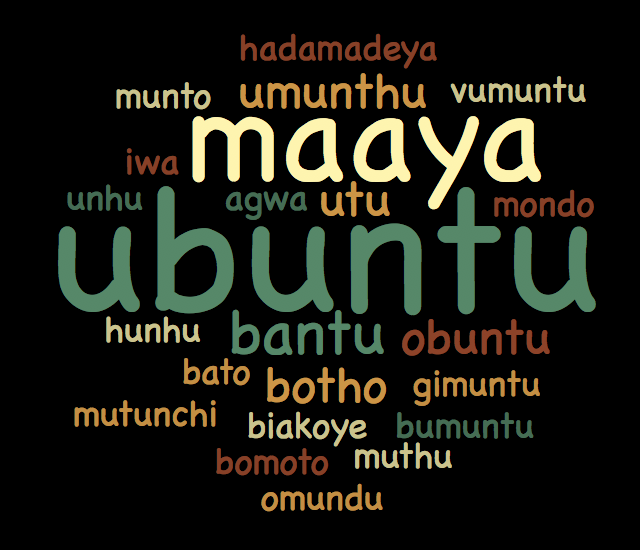
Ubuntu Survey
Research on the use of Ubuntu in teaching, learning and practice: a survey of social work and social development students, academics and practitioners
Hongera to the five participants who recently received an incentive equivalent to ZAR370) or NGN9300 after contributing to the first comprehensive research on the use of Ubuntu in teaching, learning and practice. 60 people entered the draw to get an incentive. In total, 159 people participated in the historical survey.
The first outcome is a huge data set, 106 pages of quantitative and qualitative data. This data set can be analysed, reported, published and disseminated in multiple ways. The outcomes that will come our of this data set are: journal articles, books, book chapters, workshops and courses. If you are a member of ASWNET and you feel there is an aspect of this data set you would want to publish, please get in touch with us. To become a member of ASWNET, email asw@africasocialwork.net with your name and qualifications.

Ubuntu Survey Details
Karibu. Mauya. Wamkelekile. እንኳን ደህና መጣህ. Olandiridwa. Barka. Murakaza neza. Amohelehile. Siyalemukela. Tukusanyukide. We respectfully invite you to participate in a research on Ubuntu. Details of the project are provided below.
Introduction
The Africa Social Work Network (ASWNet) through the Ubuntu Research Group (URG) is conducting a study on the use of Ubuntu in teaching, learning and practice. The research will be a survey of social work and social development students, academics and practitioners. The research seeks to ascertain knowledge about Ubuntu and how Ubuntu is used in social work and social development teaching, learning and practice. The study is motivated by the need to indigenise and decolonise social work on the African continent. Responses will help researchers, academics and practitioners (including students as trainee and future practitioners) to know where gaps are, where they are doing well and what to prioritise in their work now and in the future. Results will be shared with participating institutions as a report. Two journals articles will be published and published in open access journals. Presentations based on findings at conferences, webinars or indaba will also be done.
Information about Ubuntu
Ubuntu is the worldview of Black people of Africa from where they derive relational, communal, societal, environmental and spiritual knowledges, values and practices (Mugumbate, Mupedziswa, Twikirize, Mthethwa, Desta & Oyinlola, 2023). Ubuntu found its way into African social work about a decade ago, owing to the work of African intellectuals who were worried about the shortcomings of models of African social work that were not grounded in African philosophy. Now, Ubuntu has gained global attention. Black Africans, made up of the Bantu, Kush, Ba, Nile-Sahara, Khoi, Masarwa, Hadza and Sandawe are the custodians of Ubuntu which in some communities of Angola they have named gimuntu, Botswana (muthu), Burkina Faso, Cote d’Ivoire, Equatorial Guinea, Guinea, Gambia Liberia, Sierra Leonne and Mali (maaya), Burundi (Ubuntu), Cameroon (bato), Congo (bantu), Democratic Republic of Congo (bomoto or bantu), Ethiopia (medemer), Ghana (biako ye), Kenya (utu, munto or mondo), Malawi (umunthu), Mozambique (vumuntu), Namibia (omundu), Nigeria (mutunchi, iwa or agwa), Rwanda (ubuntu), South Africa (ubuntu or botho), Tanzania (utu, obuntu or bumuntu), Uganda (obuntu), Zambia (umunthu or ubuntu) and Zimbabwe (hunhu, unhu, botho or Ubuntu) (Mugumbate and Chereni, 2019). It has other names in other countries and communities not mentioned above.
Our request
You are being asked to complete an online survey that takes about 15 – 30 minutes on your smart phone, tablet, laptop or desktop. The questions are about your use and understanding of Ubuntu and opportunities for its increased use in social work. You will need to be connected to the internet to complete and submit the survey.
What are the benefits?
There is no risk in taking part in this study. The major benefit is your contribution to knowledge production in Africa which is important in informing social work education and practice that draws on local philosophies, knowledges and strengths.
Ethics and complaints
This study has been reviewed by the African Independent Ethics Committee (AIEC) (Ethics Advice Reference Number EA0233). For concerns or advice, please email ethics@africasocialwork.net or visit https://africasocialwork.net/african-independent-ethics-committee/
Your participation in the survey is voluntary, and your responses can be withdrawn any time before submission of the questionnaire.
Researchers
Dr Rugare Mugumbate, School of Health and Society, University of Wollongong, Australia; Convenor ASWNet; Department of Social Work & Community Development, Faculty of Humanities, University of Johannesburg, South Africa; Formerly Bindura University, Zimbabwe.
Professor Chinwe R. Nwanna, Department of Social Work, Faculty of Social Sciences, University of Lagos, Nigeria.
Associate Professor Janestic Twikirize, Department of Social Work and Social Administration, Makerere University, Uganda.
Professor Mandla Mfundo Masuku, Associate Professor in the School of Built Environment and Development Studies at the University of KwaZulu-Natal.
Dr Sharlotte Tusasiirwe, School of Social Sciences, Western Sydney University, Australia; Secretary; Association of Schools of Social Work in Africa
*All researchers are members of the Ubuntu Research Group (URG) organsied by the African Social work Network (ASWNet).
Incentives
We thank everyone for interest and participation in this research. We know that time and participation in knowledge generation can never be adequately compensated. However, we are giving an incentive of Three Hundred and Seventy South Africa Rand (ZAR370) or Nine Thousand Nine Hundred Nigeria Naira (NGN9300) each to five people who complete the survey and register their email for the chance to win. After completing the survey, you will be taken to a new screen where you will enter your email address – the email address with not be linked to the survey and your responses will remain anonymous.
Download or view a blank copy of questionnaire
To download a blank copy of the survey, use the link below. It is not possible to fill in the questionnaire in PDF but you can read and download. You can use the questionnaire or part of it for your teaching or your own research but please acknowledge the owners.



